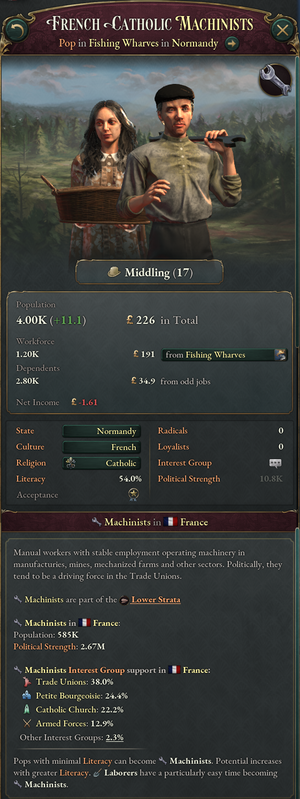Pops, short for population, are the country's engine. Every variation of profession, culture, religion, and workplace in the world gets its own unique pop. At any given time this results in many tens of thousands of pops in the world working, migrating, procreating, and agitating.
生活水平
A pop's standard of living determines how wealthy it is. Wealthier pops have higher needs, meaning that they consume more and higher-quality goods. A higher standard of living also makes a pop less radical and more loyal, especially in the short term. However, pops will come to expect their new and improved standard of living, so the benefits of old increases will wear off over time.
文化
The culture of the pops decide whether it is discriminated against, depending on the laws. Different cultures have different obsessions and taboos. Cultures share traits that determine if that culture will be discriminated against or not if the player has racial segregation
Influencing pops
Though the player might be in charge of the country, they're not in charge of the pops and can't manipulate them directly. That said, everything done in the country affects them, and they in turn will react in what they perceive to be their own best interests. A large part of the game consists of trying to sate the population's appetites for material goods or political reform. Even so, most of the actions taken will not be to the benefit of every pop in the nation, and by making life better for one part of the population, inadvertently, another demographic will become upset.
In short: nothing in the country runs without pops, and everything about the country affects those pops, who in turn provide new opportunities and challenges during your tumultuous journey through the Victorian era and beyond.
职业
- 主条目:Profession
对于一个人群(PoP)来说,最重要的属性便是他们的职业,这反映了人群(PoP)在他们工作的建筑物中所从事的工作类型。人群(PoP)的职业决定了其社会阶层,并可能影响其工资、政治实力、它可能有资格从事的其他职业,以及它倾向于支持哪些政治利益集团。鼓励和扶植特定的人群(PoP)并使他们进入本国所鼓励的职业是维多利亚3“社会建设”游戏玩法的关键。
劳动力&受扶养人口
The people that make up a pop are distinguished into workforce and dependents. Members of the workforce keep the buildings in the game operational and collect a wage from them in return. Those who cannot or aren't permitted to be officially employed are considered dependents. They collect only a small income from odd jobs and government programs.
Laws affect who is included in each category. At game start most countries do not accept women working and collecting a wage outside the home but by reforming laws governing the rights of women more dependent pops will enter the workforce over time. By abolishing child labor, the amount of income dependents bring home will decrease but will make it easier to educate the populace, increasing their overall literacy. After a bloody war many dependents of soldiers may be left without sufficient income, and you may decide to institute pensions to help the population recover.
人口增长
Population growth is percentage based. Net growth is based on birth rate against mortality rate. The base birth and mortality rates are based on a pop's standard of living, with base birth rate decreasing at high standard of living, but base mortality decreasing at a higher rate, meaning that by default pops without any modifiers will grow faster at higher standards of living.
Birthrate can be increased by the Legal Guardianship law for rights of women in human rights laws, and the Be Fruitful and Multiply trait for the Devout interest group when their approval is at or above 10. Mortality has many modifiers, but the best way to decrease it is the healthcare institution.
Eventually population growth will hit a wall due to overpopulation, a negative percentage modifier applied to birth rate in a state which also reduced migration attraction, applied based on the size of a state vs. it's current population.
Population can also grow through net migration. To increase migration, the laws No Migration Controls, Multiculturalism, Total Separation(of church and state) are optimal. A high standard of living, the decree Greener Grass Campaign, and the Propagandists trait from the literati (+10 approval or higher) also increase migration attraction.
同化
The base rate of assimilation is 0.2% per month and can be increased by using the "Promote National Values" decree or having the educational law "Public Schools" passed. If there is any assimilation going on, at least 10 pops minimum will assimilate.
The conditions for assimilation require that a Pop is:
- Culturally accepted
- Not in their Homeland
This leads to several possible outcomes:
- In a State which is a Homeland to one of the primary cultures of the nation, they will assimilate to the primary culture
- In a State which is not a Homeland to one of the primary cultures, it will assimilate to the largest Pop which has it's Homeland there.
What this means is that a Czech pop in Germany will not assimilate in Bohemia, will assimilate into North German in Silesia, into South German in Bavaria and into Hungarian or Romanian in Transylvania (whichever is more dominant).
皈依
The base rate of conversion is 0.2% per month and can be increased by using the "Promote National Values" decree or having the educational law "Religous Schools" passed. If there is any conversion going on, at least 10 pops minimum will convert.
The conditions for conversions require that a Pop is:
- Religiously discriminated against
This leads to 2 possible outcomes:
- If the law "Freedom of Conscience" is passed, then the pop will convert to whatever the dominant religion in the state it resides in has the same religious trait as the dominant religion of the country.
- If the law "State Religion" is passed, then the pop will convert to the dominant religion of the country.
What this means is that in the first case a non-Christian pop will convert to Catholic in Nebraska, even if the dominant religion in the US is Protestantism as there are more Catholics in that state, than Protestants. In the second case, any non-Protestant pop would convert to Protestantism.
